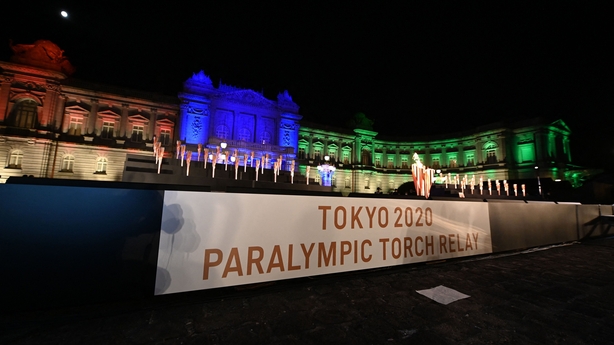The International Paralympic Committee president Andrew Parsons has dismissed suggestions that the presence of the Olympic and Paralympic Games is related to the rising number of Covid-19 cases in Tokyo.
Japan has extended Covid-19 emergency measures in the capital and other regions that will run through the Games and, like the Olympics, the 24 August to 5 September Paralympics will take place generally without spectators.
Tokyo Paralympics organisers had said that the Games will be held under "very difficult" circumstances, with hospitals in the host city overstretched as the country battles its worse wave of Covid-19 infections, driven by the Delta variant.
Speaking to RTÉ Sport's Darren Frehill in Tokyo ahead of Tuesday's Paralympic Games opening ceremony, Parsons said that, in his view, there was no "cause-effect relationship" between the rise in cases and the event.
"I am concerned with the Japanese people as human beings," said the Brazilian.
"I come from a nation that is hit really hard so I do understand the frustration and I do understand the concern and sometimes I do understand the anger with the situation.
"But we don't see - and it has been proven by studies and with what happened with the Olympics - that there is a cause-effect relationship between what is going on in the Paralympic bubble with what is going on in Japan and Tokyo in general.
"We don't think there is a relationship. We think we can come here. Our presence here is not increasing the numbers because of all the restrictions, because the Paralympic-specific population is in the village and we are not having contact with the Japanese population.
"I worry about them, of course, as human beings but I don't think that we are making, with our presence here in this nation, the situation to get worse."
Parsons added that the "number one priority was to have a safe Games" and that the legacy aimed for is a "more inclusive society".

"Here in Japan, you don't see people with disabilities in the street in the same proportion as the city is accessible. The city is quite accessible compared to other cities. But you don't see people with disabilities. They are at home, they are over-protected," he said.
"So it does not come from a negative angle of 'second-class citizens'. It comes from over-protecting. I think Japanese society needs to understand that persons with disability don't need to be protected, they need to be given opportunity. That is the key we would like to turn with our presence here."
Parsons also discussed his Irish roots and why he will be following the exploits of this country's participants closely during the Games.
"I have a great-grandfather who was Irish but I really admire the Paralympic movement in Ireland," he said.
"Not only the top athletes like Ellen Keane and Jason Smyth but I really like what the Irish Paralympic Committee is doing in terms of communication and in terms of their approach to developing the sport.
"I think they're doing a very good job. I've been to Ireland a few times to get to know that better and to understand what is going on in the Paralympic movement there. So a part of me will be cheering for Ireland in these Games."


